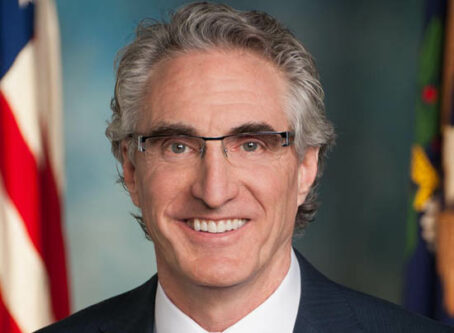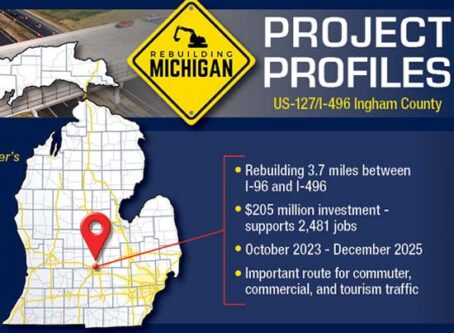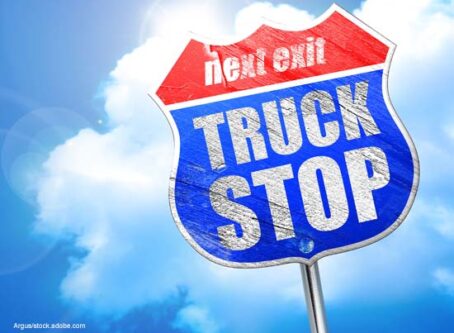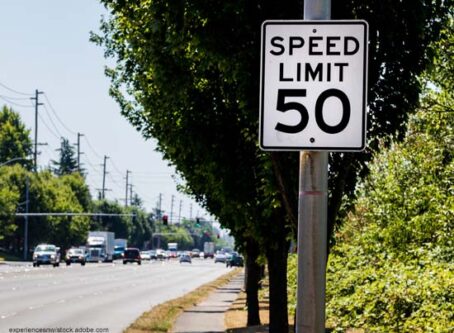UPDATE: Officials in nine statehouses consider tolls
As the feds continue to discuss an infrastructure plan to benefit roads, bridges and transit throughout the nation, state lawmakers are pursuing efforts to raise revenue on their own via tolls. At the same time, some legislators want to restrict or prohibit toll collection.
The Owner-Operator Independent Drivers Association believes increasing the fuel tax is the most equitable way for states to generate additional revenue.
Connecticut
State legislators are pursuing plans that would end Connecticut’s distinction as the lone New England state without any kind of tolling program. Gov. Ned Lamont also wants to change that fact.
The new Democratic governor has said truck-only tolls is one option the state should pursue to help cover expenses for needed transportation work. Another option touted by Lamont would use an all-electronic toll system to charge all users.
The Connecticut Department of Transportation has estimated that charging all users could raise up to $1 billion annually for the state.
Sen. Alexandra Bergstein, D-Greenwich, has a bill – SB102 – to establish electronic tolls on major highways for all users.
A related bill from Bergstein, SB99, calls for studying the conversion of one lane on Interstate 95 to a high-occupancy vehicle lane or express lane.
The Joint Committee on Transportation is scheduled to hear discussion this week on two more bills of note.
HB7202 would implement the governor’s recommendations to collect all-electronic tolls on all users. The legislation specifies that tolls would be collected on Interstates 84, 91, and 95 and state Route 15.
HB7280 would require CTDOT to submit a tolling proposal to the General Assembly. Additionally, a transportation finance authority would be created to eventually set toll rates.
Critics point out the legislature would only have 15 days to vote on toll recommendations. Failure to act would greenlight the authority to the Federal Highway Administration.
Florida
The Senate Infrastructure and Security Committee has voted unanimously to advance a bill to move three toll projects forward.
Senate President Bill Galvano has called for extending the Suncoast Parkway from the Tampa Bay area to the Georgia line.
Galvano says the 150-mile-long project would help the economies of rural areas along the path.
Additional projects touted by Galvano include a highway to connect Polk County to Collier County, and a connector for the Florida Turnpike west to the Suncoast Parkway.
“The time has come to prioritize these critical infrastructure enhancements and to combine those efforts with innovations that enhance surrounding communities,” Galvano said in a released statement.
“The benefits of this type of long-term investment in our infrastructure include regional connectivity that enhances trade and tourism, congestion mitigation and evacuation routes.”
The bill, SB7068, would have the Florida DOT study the three projects. Construction would begin within three years.
Maryland
Democratic lawmakers are taking steps to block a plan from Gov. Larry Hogan to expand and potentially add tolled lanes to Interstates 270 and 495.
The Republican governor has a $9 billion plan to use the state’s 6-year-old public-private partnership authorization to add new express toll lanes, in addition to existing lanes, on the highways.
Montgomery County Delegates Marc Korman and Alfred Carr have introduced a bill, HB91, to require an environmental impact study to be completed before the state DOT solicits private contractors to work on the highway system expansion.
Transportation Director Pete Rahn has said numerous studies have already occurred over the years.
A separate bill, HB102, from Delegate Brooke Lierman, D-Baltimore City, would prohibit construction of roadway expansion, toll lanes and bridges without approval of affected counties. The Senate version is SB442.
Currently, Maryland law has the protection in place only for Eastern Shore counties.
Republican Anne Arundel County Delegate Michael Malone and Sen. Edward Reilly have bills, HB212 and SB107, to prohibit the construction of a toll road or bridge in Anne Arundel County without the consent of county officials.
HB456 would apply the same protection against toll projects for Prince George County.
Delegate Vaughn Stewart, D-Montgomery, and Sen. Clarence Lam, D-Baltimore, have one more effort – HB277 and SB249 – to require a comprehensive study of greenhouse gas emissions and air pollution related to state-funded highway projects or projects through a public-private partnership.
Missouri
An effort awaiting consideration in the House Transportation Committee would collect more revenue for transportation.
Sponsored by Rep. Jeff Messenger, R-Greene, HJR15 proposes an amendment to the state’s Constitution to authorize the construction and operation of toll roads. Tolls could be collected at the entrances of interstates or four-lane roadways.
The federal government must authorize the toll project.
New Hampshire
A House bill would establish a commission to evaluate whether the collection of tolls on the state’s turnpike system is cost effective.
Sponsored by Reps. Max Abramson and Al Baldasaro, HB515 would include consideration of “unintended costs,” such as congestion on other roads caused by toll avoidance, reduced retail sales in towns and cities near toll booths, and increased wear and tear on vehicles due to increased congestion.
The bill is in the House Public Works and Highways Committee.
South Carolina
Road revenue in South Carolina is on the rise. However, it is not enough to address the state’s overall transportation funding needs.
A 2017 state law increased the then-16.75-cent fuel tax rate. Specifically, the tax rate will increase by 2-cent increments over six years to benefit the state’s roads and bridges. When fully implemented, the additional 12 cents in tax revenue is estimated to raise $630 million per year.
In an effort to further reduce the remaining transportation funding gap, estimated at $370 million, is a bill to authorize putting toll booths on a portion of Interstate 95. The tax revenue would be used to pay for road widening and repairs.
Sens. Kevin Johnson, D-Clarendon, and Brad Hutto, D-Orangeburg, are behind a bill to require the state Department of Transportation to charge highway users to access I-95 where it crosses Lake Marion in either Orangeburg County or Clarendon County.
The bill, S178, is in the Senate Transportation Committee. The House version, H3739, is in the House Education and Public Works Committee.
OOIDA opposes the legislative effort. The truckers group says the toll location would effectively prevent diversion because going around the lake would be “impractical.”
“The proposed toll collection location is clearly intended to target through traffic, which will undoubtedly have a disproportionate impact on commercial trucks,” said OOIDA Manager of Government Affairs Mike Matousek. “This is simply wrong.”
Texas
Multiple bills up for consideration at the statehouse cover toll collection cessation and alternate routes.
Sponsored by Rep. Matt Shaheen, R-Plano, HB436 would remove tolls from highways once the costs of acquisition and construction of the project have been paid. At that time, the affected roadway would become a part of the state highway system.
“The government’s job is to provide roads that are funded through existing tax structures … and historically the Legislature has underfunded transportation causing the need for toll roads,” Shaheen said.
“With recent increases in transportation funding, Texas needs a strategy to rid our roadways of toll roads.”
A similar bill, HB505, also would prohibit a toll project entity from amending a financing or other agreement to delay transference of the road to the state highway system. A public vote could be held to decide whether to extend the toll cessation date by five years.
The third bill, HB506, would mandate that any tolling authority looking to construct a toll route must add at least one adjacent nontolled lane of frontage road along a previously nontolled highway. The Senate version is SB374.
Another bill, HB1951, would require voter approval for all new toll projects. Roads also would be required to have an end date for collecting tolls.
One more House bill, HB803, would require all toll road entities to publish toll road-specific financial data each year.
Virginia
Multiple bills introduced during the regular session have died that sought to create truck-only tolls on Interstate 81. In their wake, multiple tolling authorization efforts have passed through the statehouse and are on the governor’s desk.
A House and Senate bill, HB2718 and SB1716, each call for the formation of a committee of legislators and transportation officials to discuss improvements to Interstate 81. The amended legislation calls for a panel to study what travelers would tolerate to access the roadway.
As introduced, the legislation sought to impose tolls on all users of I-81.
One more bill – HB2527 – on Gov. Ralph Northam’s desk would prohibit toll collection in Northern Virginia along any primary, secondary, or urban highway without prior approval by the General Assembly.
Washington
The Senate Transportation Committee voted to advance a bill to place restrictions on toll collection.
Sponsored by Sen. Tim Sheldon, D-Potlach, SB5104 would prohibit cities, counties and other local governments from imposing tolls, and would establish that tolls can only be imposed by the Legislature.
Sheldon says the protection would “block Seattle’s plan to impose tolls on downtown streets.”
Seattle Mayor Jenny Durkan is having the city look into collecting toll fees in the downtown area. According to local reports, a total of $1.2 million has been dedicated in the last two city budgets to pursue tolls to reduce congestion and reduce greenhouse-gas emissions.
“We’ve paid for the roads once already, with taxes for construction and maintenance,” Sheldon stated. “We shouldn’t have to pay again to use them.”
The bill awaits further consideration in the Senate.
Related story:
A dozen statehouses consider bills regarding toll collection









